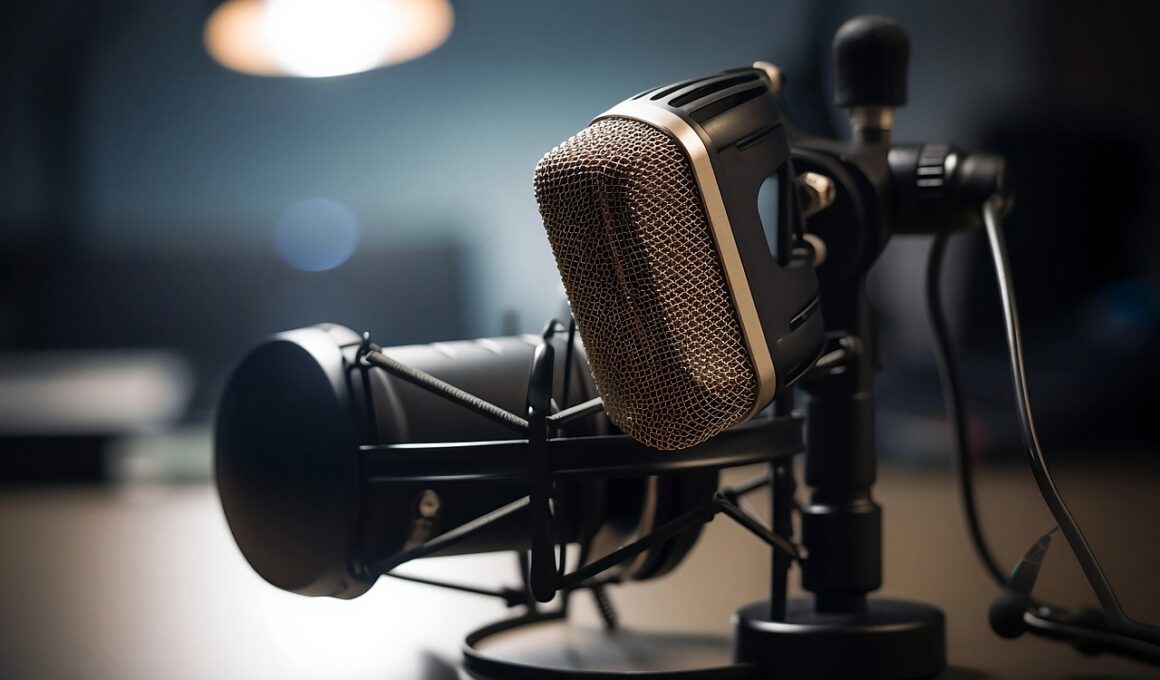Understanding Copyright for User-Generated Podcasts
Creating user-generated podcasts can be an exciting venture, yet it exposes creators to copyright laws, which are critical to understand. Copyright is a legal framework that grants the creator exclusive rights to their original works. When podcasters produce episodes, they might incorporate various media, such as music, sound clips, or written content, which could infringe on someone else’s copyright. To navigate this complexity, it’s vital for creators to be aware of what elements of their podcast are protected by copyright. Typically, spoken words, their arrangement, and sound recordings may be subject to copyright protection. However, this leads to questions regarding the use of copyrighted media in podcasts. The key here is to pursue licensing agreements or utilize public domain or royalty-free content. When adopting third-party material, obtaining written permission is a best practice that helps to avoid potential legal pitfalls. Furthermore, understanding Fair Use can provide a legal lifeline for creators. This doctrine allows for limited use of copyrighted material without permission. However, determining Fair Use is highly subjective and can depend on various factors.
Before using any content, it is crucial to define the scope of Fair Use. Fair Use in podcasting can be beneficial when discussing a subject in a commentary or critique. For instance, asserting transformative use—where the material is repurposed with added meaning or context—often strengthens the argument for Fair Use. However, podcasters should tread carefully because missteps can lead to costly lawsuits or cease-and-desist orders. This risk necessitates a thorough understanding of your podcast’s content and purpose. Additionally, maintaining proper records of communications regarding any permissions received is essential; it can serve as evidence if copyright issues arise later on. Notably, a critical aspect of using external content is attributing sources accurately. Yet, attribution alone does not grant permission; copyright still applies regardless of whether you cite a creator’s work. Subsequently, podcasters can explore Creative Commons licensing, which allows creators to use each other’s work under specific conditions without seeking ongoing permission. This model facilitates sharing and collaboration but demands that usage adheres strictly to license terms.
Exploring Music Licensing
Music is a fundamental component of many podcasts, setting the tone and enhancing the narrative. While many creators rely on generic music, incorporating well-known tracks requires careful navigation of copyright law. Licensing music for podcasts can be intricate, as it often demands payment of royalties or direct licenses from copyright holders. Copyright infringement occurs when a podcast uses a piece of music without securing the appropriate rights. This infringement can lead to severe consequences, including removal of content and hefty fines. Alternatively, utilizing music libraries offering royalty-free tracks can alleviate this burden. Creators must carefully read the terms of service to ensure they understand how music can be used in their podcasts. Furthermore, platforms like Epidemic Sound and Artlist provide extensive libraries catered specifically for podcasters, often simplifying the licensing process while ensuring compliance. Also, it’s worth noting that artists are more amenable to how their music is presented in unsolicited projects. Engaging with artists can foster relationships that can lead to mutually beneficial agreements for music use.
Beyond music licensing, podcasters must also consider the implications of user-generated content. Many podcasts invite listeners to submit stories or contribute their own audio clips. While this creates an element of community, it raises questions regarding copyright ownership of these submissions. Creators must establish clear policies or disclaimers before engaging their audience for content contributions. When seeking user-generated submissions, obtain written permission to use these contributions, ensuring all parties understand copyright implications from the outset. Moreover, documented agreements comprehensively clarify rights and usage expectations, protecting both the creator and the contributors from possible disputes. It‘s essential to recognize that contributors maintain rights over their original works; however, by participating, they may grant creators specific licenses to use those works. Crafting an agreement that outlines the scope of usage can enhance trust while minimizing misunderstandings. Educating contributors on these policies strengthens your community and bolsters confidence in your podcast’s integrity, thus fostering an environment of creativity alongside regulations . This foundation allows for innovative and secure collaborations in the podcasting space.
Attribution Practices in Podcasts
In the dynamic realm of podcasting, proper attribution practices cannot be overstated. Attribution ensures that those whose work influences and enriches the podcast are rightly recognized. While the law does not always require attribution, ethical considerations compel creators to honor the original authors. This extends beyond just music and user-submitted content to also include any sourced material or literature referenced throughout episodes. Many podcasters integrate show notes, which provide a formal platform to credit sources, enabling audiences to access the referenced works directly. Additionally, these notes allow creators to outline the terms under which borrowed material is used, offering transparency. Mentioning contributors and sources on social media can also further amplify reach and respect for original creators. Good practice involves promoting artists and contributors, particularly within niche genres, to build positive relationships and potentially collaborate in the future. When podcasters actively engage with their audience regarding copyright, it can cultivate an informed community of listeners and creators while fostering a culture of respect around intellectual property.
Furthermore, understanding the evolving nature of copyright in the digital era is paramount for podcasters. Various platforms have specific guidelines and regulations that govern copyright enforcement and community standards. Social media platforms, for example, have become proactive in enforcing copyright laws, which can lead to unintentional removals of podcast episodes or clips sharing copyrighted materials. If a podcaster primarily uses social media to promote their work, awareness of the varying copyright regulations across platforms is essential. Additionally, with the rise of Artificial Intelligence and digital content creation, concerns around copyright infringement have become more pronounced. AI can produce work that simulates original content, leading to blurred lines in ownership and rights. As audiences engage with such content, discussions around fair compensation and attribution become increasingly relevant. Creators should stay informed about legislation changes and consider the implications they may have on their work. In this landscape, advocating for creators’ rights and upholding copyright laws ensures fair treatment and sustainable practices in the podcasting industry.
Taking Action for Copyright Compliance
To maintain copyright compliance, podcasters must adopt proactive measures. Begin by conducting an audit of your podcast to identify all elements that may require licensing or permissions. Review music, sound bites, and external content to ensure compliance with copyright regulations. Engaging legal counsel can also provide clarity regarding legal obligations and potential risks inherent in your content. Seeking professional advice can assist in navigating complicated usage rights effectively. Additionally, implementing clear copyright policies across all content encourages responsible practices within the podcasting community. For instance, organizations could establish resources or templates that guide creators in understanding how to manage copyright risks. Moreover, educational resources such as workshops and webinars can enhance awareness among creators and audiences about the significance of copyright law in podcasting. By fostering a culture of compliance, you build a trustworthy platform that brings license terms into active discussion. Ultimately, taking such actionable steps protects your podcast while encouraging safe engagement with content created by others. This collaborative spirit helps stretch the creative horizons of podcasting while acknowledging the legal frameworks that help maintain balance.
In conclusion, the intersection of user-generated content and copyright law presents both challenges and opportunities for podcasters. Being informed about copyright protections surrounding content enables creators to harness their creativity without fear of infringement. Understanding what is protected by copyright, proper licensing practices, and legally leveraging user-generated content can enhance the podcasting experience, fostering growth in communities. Adhering to best practices in attribution, and engaging legally with external content also promote respect and collaboration amongst creators. Moreover, public discourse about copyright laws and their implications on audiences should be encouraged. Creators must position themselves as advocates for copyright education within their circles. By navigating the murky waters of copyright, podcasters can minimize legal risks while maximizing their content’s reach and impact. Additionally, as technology evolves, the dialogue around copyright must adapt to safeguard creators’ rights while fostering a culture of innovation. Thus, there exists a profound need for creators to remain vigilant and informed about copyright matters as they journey through the dynamic podcasting landscape.


